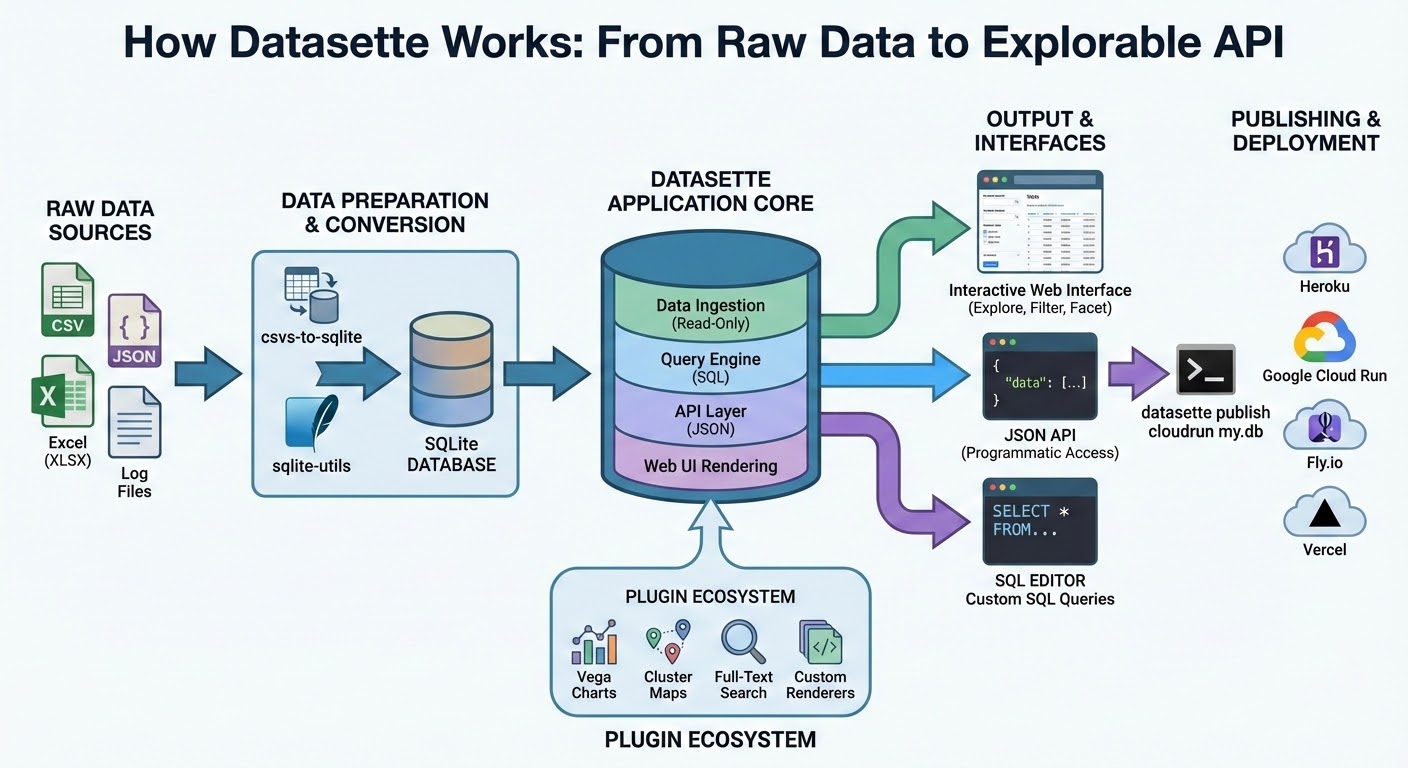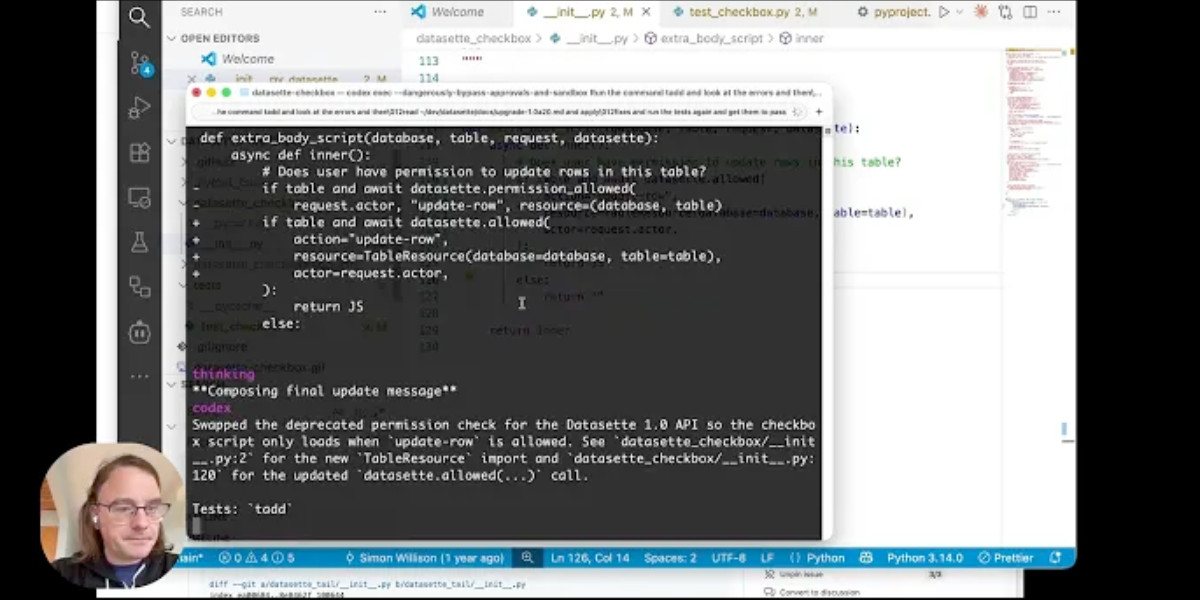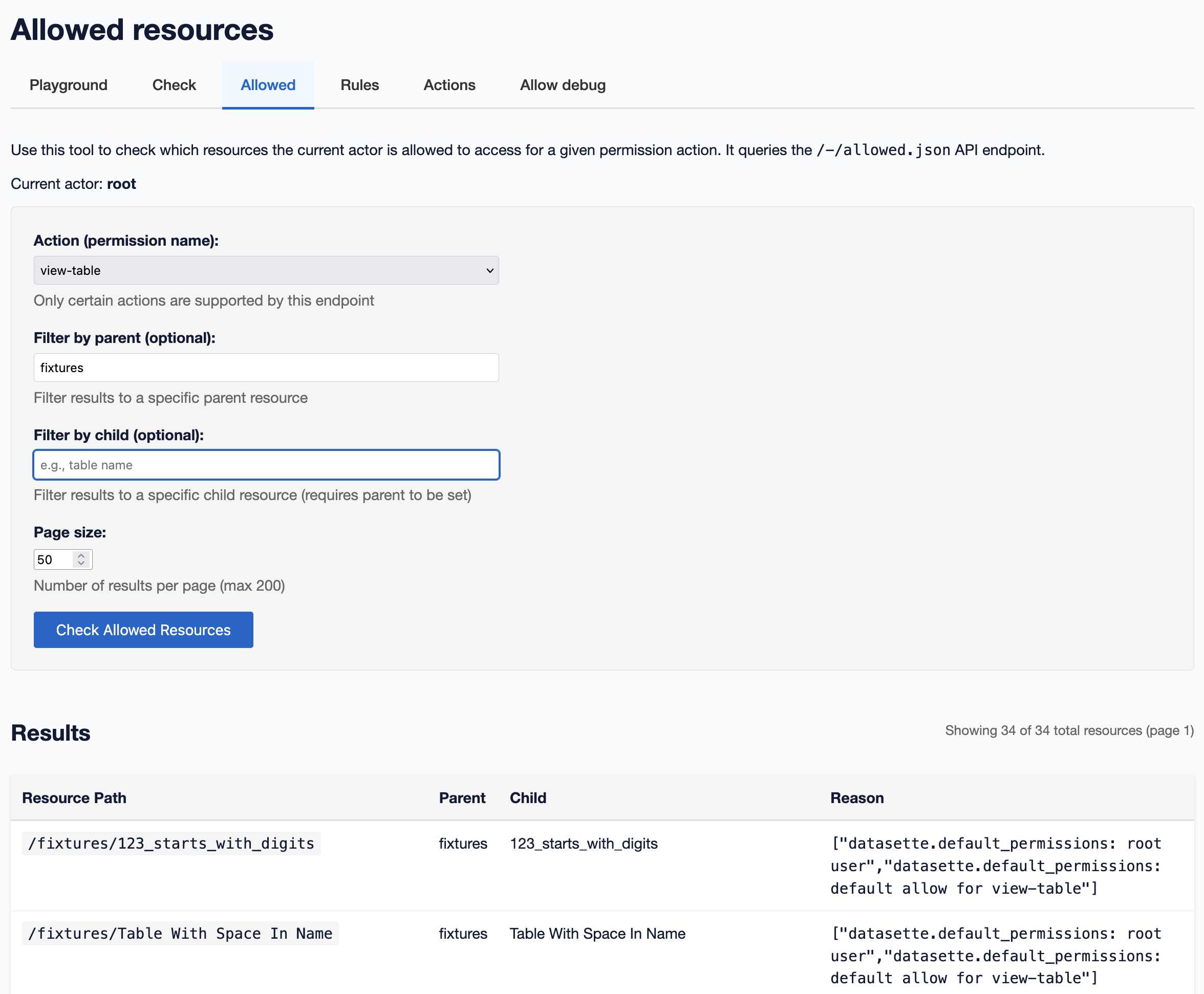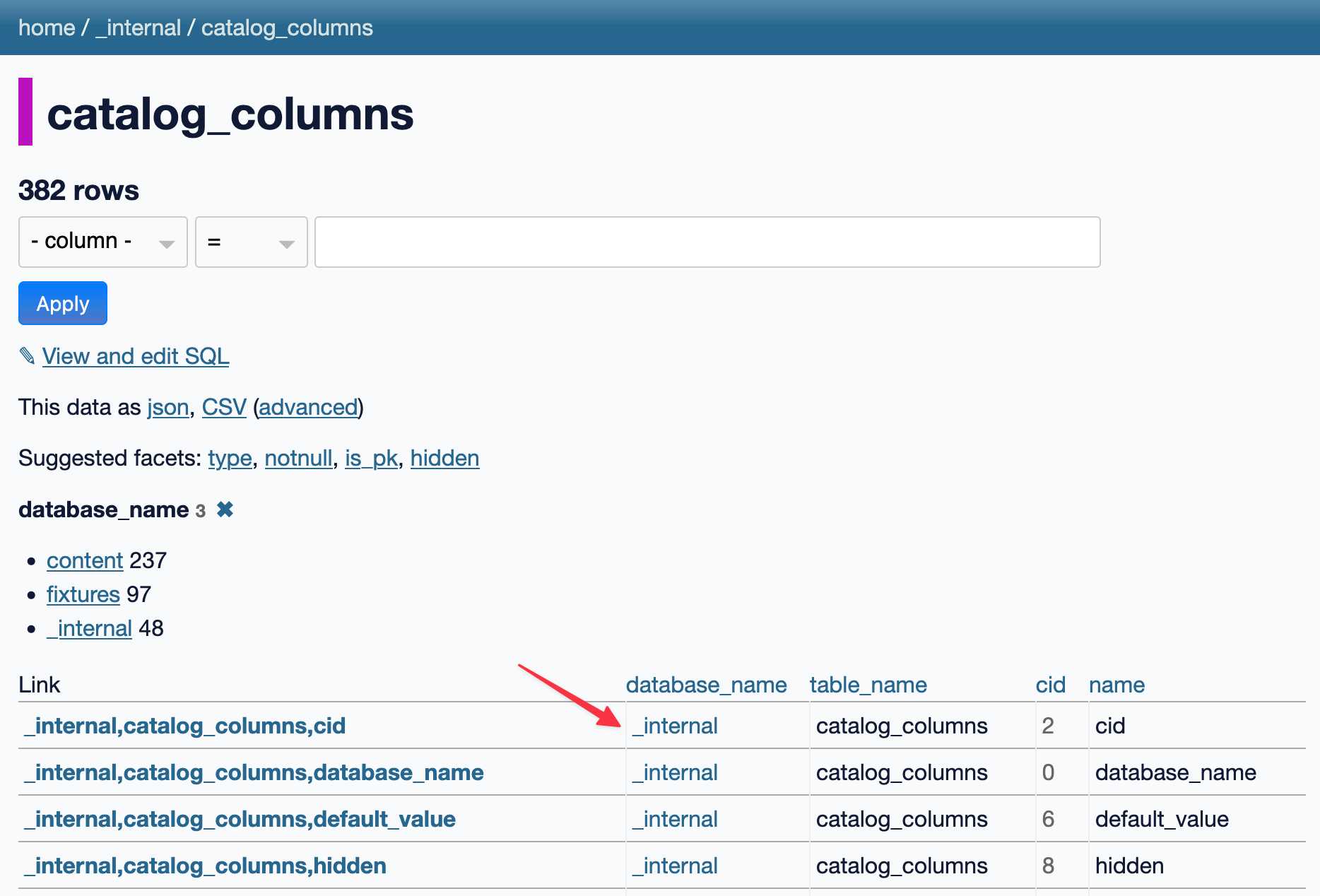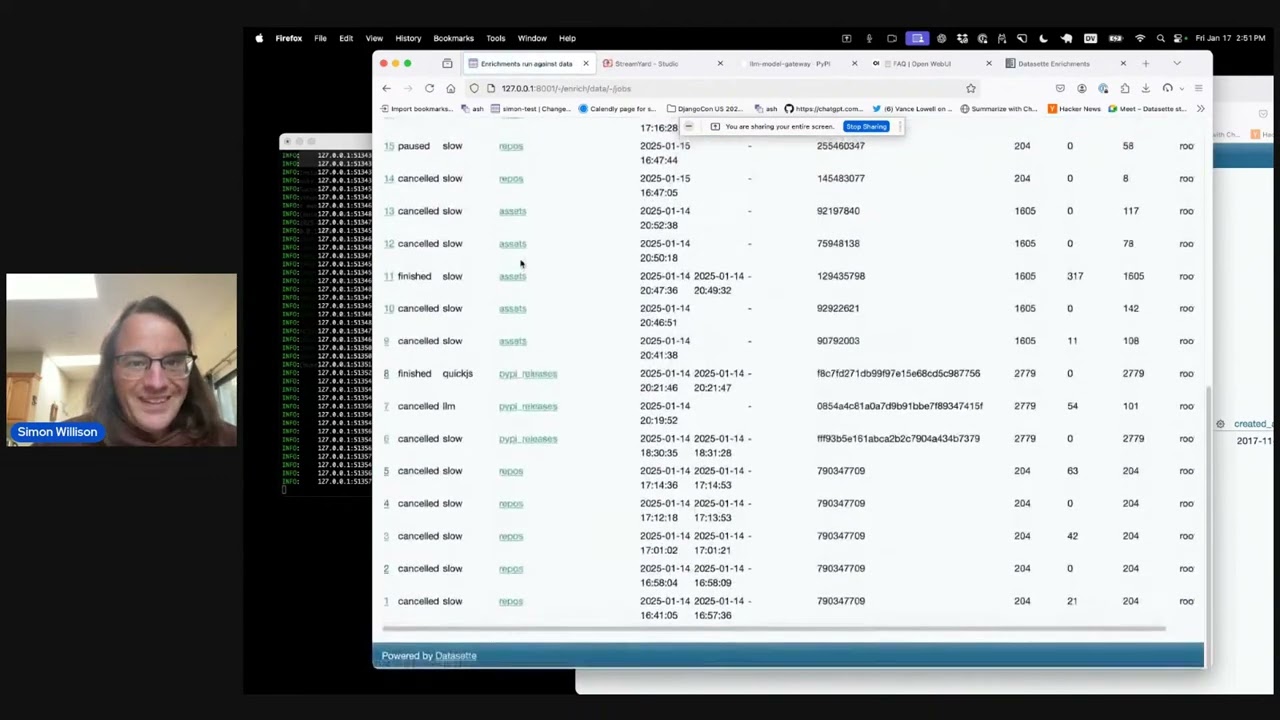452 posts tagged “datasette”
Datasette is an open source tool for exploring and publishing data.
2026
Datasette 1.0a24. New Datasette alpha this morning. Key new features:
- Datasette's
Requestobject can now handlemultipart/form-datafile uploads via the new await request.form(files=True) method. I plan to use this for adatasette-filesplugin to support attaching files to rows of data. - The recommended development environment for hacking on Datasette itself now uses uv. Crucially, you can clone Datasette and run
uv run pytestto run the tests without needing to manually create a virtual environment or install dependencies first, thanks to the dev dependency group pattern. - A new
?_extra=render_cellparameter for both table and row JSON pages to return the results of executing the render_cell() plugin hook. This should unlock new JavaScript UI features in the future.
More details in the release notes. I also invested a bunch of work in eliminating flaky tests that were intermittently failing in CI - I think those are all handled now.
The most popular blogs of Hacker News in 2025 (via) Michael Lynch maintains HN Popularity Contest, a site that tracks personal blogs on Hacker News and scores them based on how well they perform on that platform.
The engine behind the project is the domain-meta.csv CSV on GiHub, a hand-curated list of known personal blogs with author and bio and tag metadata, which Michael uses to separate out personal blog posts from other types of content.
I came top of the rankings in 2023, 2024 and 2025 but I'm listed in third place for all time behind Paul Graham and Brian Krebs.
I dug around in the browser inspector and was delighted to find that the data powering the site is served with open CORS headers, which means you can easily explore it with external services like Datasette Lite.
Here's a convoluted window function query Claude Opus 4.5 wrote for me which, for a given domain, shows where that domain ranked for each year since it first appeared in the dataset:
with yearly_scores as ( select domain, strftime('%Y', date) as year, sum(score) as total_score, count(distinct date) as days_mentioned from "hn-data" group by domain, strftime('%Y', date) ), ranked as ( select domain, year, total_score, days_mentioned, rank() over (partition by year order by total_score desc) as rank from yearly_scores ) select r.year, r.total_score, r.rank, r.days_mentioned from ranked r where r.domain = :domain and r.year >= ( select min(strftime('%Y', date)) from "hn-data" where domain = :domain ) order by r.year desc
(I just noticed that the last and r.year >= ( clause isn't actually needed here.)
My simonwillison.net results show me ranked 3rd in 2022, 30th in 2021 and 85th back in 2007 - though I expect there are many personal blogs from that year which haven't yet been manually added to Michael's list.
Also useful is that every domain gets its own CORS-enabled CSV file with details of the actual Hacker News submitted from that domain, e.g. https://hn-popularity.cdn.refactoringenglish.com/domains/simonwillison.net.csv. Here's that one in Datasette Lite.
2025
Under the hood of Canada Spends with Brendan Samek
I talked to Brendan Samek about Canada Spends, a project from Build Canada that makes Canadian government financial data accessible and explorable using a combination of Datasette, a neat custom frontend, Ruby ingestion scripts, sqlite-utils and pieces of LLM-powered PDF extraction.
[... 561 words]Highlights from my appearance on the Data Renegades podcast with CL Kao and Dori Wilson
I talked with CL Kao and Dori Wilson for an episode of their new Data Renegades podcast titled Data Journalism Unleashed with Simon Willison.
[... 2,964 words]Nano Banana Pro aka gemini-3-pro-image-preview is the best available image generation model
Hot on the heels of Tuesday’s Gemini 3 Pro release, today it’s Nano Banana Pro, also known as Gemini 3 Pro Image. I’ve had a few days of preview access and this is an astonishingly capable image generation model.
[... 1,641 words]How I automate my Substack newsletter with content from my blog
I sent out my weekly-ish Substack newsletter this morning and took the opportunity to record a YouTube video demonstrating my process and describing the different components that make it work. There’s a lot of digital duct tape involved, taking the content from Django+Heroku+PostgreSQL to GitHub Actions to SQLite+Datasette+Fly.io to JavaScript+Observable and finally to Substack.
[... 1,345 words]Datasette 1.0a22. New Datasette 1.0 alpha, adding some small features we needed to properly integrate the new permissions system with Datasette Cloud:
datasette serve --default-denyoption for running Datasette configured to deny all permissions by default. (#2592)datasette.is_client()method for detecting if code is executing inside a datasette.client request. (#2594)
Plus a developer experience improvement for plugin authors:
datasette.pmproperty can now be used to register and unregister plugins in tests. (#2595)
I've been upgrading a ton of Datasette plugins recently for compatibility with the Datasette 1.0a20 release from last week - 35 so far.
A lot of the work is very repetitive so I've been outsourcing it to Codex CLI. Here's the recipe I've landed on:
codex exec --dangerously-bypass-approvals-and-sandbox \
'Run the command tadd and look at the errors and then
read ~/dev/datasette/docs/upgrade-1.0a20.md and apply
fixes and run the tests again and get them to pass.
Also delete the .github directory entirely and replace
it by running this:
cp -r ~/dev/ecosystem/datasette-os-info/.github .
Run a git diff against that to make sure it looks OK
- if there are any notable differences e.g. switching
from Twine to the PyPI uploader or deleting code that
does a special deploy or configures something like
playwright include that in your final report.
If the project still uses setup.py then edit that new
test.yml and publish.yaml to mention setup.py not pyproject.toml
If this project has pyproject.toml make sure the license
line in that looks like this:
license = "Apache-2.0"
And remove any license thing from the classifiers= array
Update the Datasette dependency in pyproject.toml or
setup.py to "datasette>=1.0a21"
And make sure requires-python is >=3.10'I featured a simpler version of this prompt in my Datasette plugin upgrade video, but I've expanded it quite a bit since then.
At one point I had six terminal windows open running this same prompt against six different repos - probably my most extreme case of parallel agents yet.
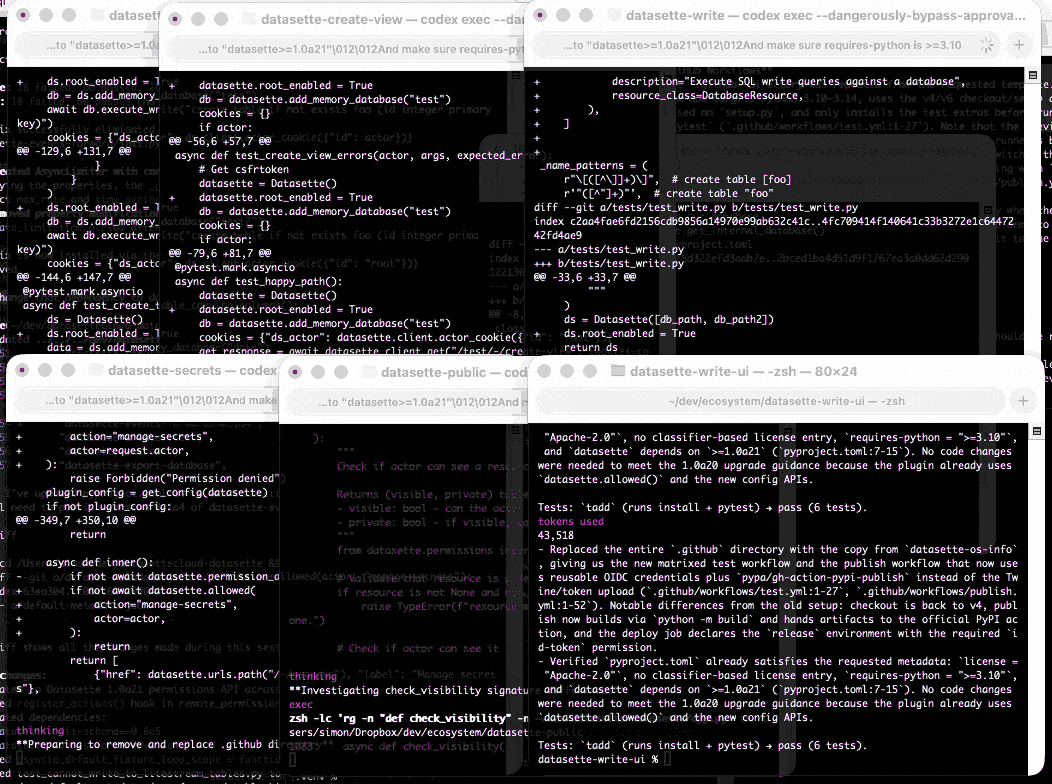
Here are the six resulting commits from those six coding agent sessions:
Video + notes on upgrading a Datasette plugin for the latest 1.0 alpha, with help from uv and OpenAI Codex CLI
I’m upgrading various plugins for compatibility with the new Datasette 1.0a20 alpha release and I decided to record a video of the process. This post accompanies that video with detailed additional notes.
[... 1,094 words]Open redirect endpoint in Datasette prior to 0.65.2 and 1.0a21. This GitHub security advisory covers two new releases of Datasette that I shipped today, both addressing the same open redirect issue with a fix by James Jefferies.
Datasette 0.65.2 fixes the bug and also adds Python 3.14 support and a datasette publish cloudrun fix.
Datasette 1.0a21 also has that Cloud Run fix and two other small new features:
I decided to include the Cloud Run deployment fix so anyone with Datasette instances deployed to Cloud Run can update them with the new patched versions.
A new SQL-powered permissions system in Datasette 1.0a20
Datasette 1.0a20 is out with the biggest breaking API change on the road to 1.0, improving how Datasette’s permissions system works by migrating permission logic to SQL running in SQLite. This release involved 163 commits, with 10,660 additions and 1,825 deletions, most of which was written with the help of Claude Code.
[... 2,750 words]Claude can write complete Datasette plugins now
This isn’t necessarily surprising, but it’s worth noting anyway. Claude Sonnet 4.5 is capable of building a full Datasette plugin now.
[... 1,296 words]Two of my public Datasette instances - for my TILs and my blog's backup mirror - were getting hammered with misbehaving bot traffic today. Scaling them up to more Fly instances got them running again but I'd rather not pay extra just so bots can crawl me harder.
The log files showed the main problem was facets: Datasette provides these by default on the table page, but they can be combined in ways that keep poorly written crawlers busy visiting different variants of the same page over and over again.
So I turned those off. I'm now running those instances with --setting allow_facet off (described here), and my logs are full of lines that look like this. The "400 Bad Request" means a bot was blocked from loading the page:
GET /simonwillisonblog/blog_entry?_facet_date=created&_facet=series_id&_facet_size=max&_facet=extra_head_html&_sort=is_draft&created__date=2012-01-30 HTTP/1.1" 400 Bad Request
llm-openrouter 0.5. New release of my LLM plugin for accessing models made available via OpenRouter. The release notes in full:
- Support for tool calling. Thanks, James Sanford. #43
- Support for reasoning options, for example
llm -m openrouter/openai/gpt-5 'prove dogs exist' -o reasoning_effort medium. #45
Tool calling is a really big deal, as it means you can now use the plugin to try out tools (and build agents, if you like) against any of the 179 tool-enabled models on that platform:
llm install llm-openrouter
llm keys set openrouter
# Paste key here
llm models --tools | grep 'OpenRouter:' | wc -l
# Outputs 179
Quite a few of the models hosted on OpenRouter can be accessed for free. Here's a tool-usage example using the llm-tools-datasette plugin against the new Grok 4 Fast model:
llm install llm-tools-datasette
llm -m openrouter/x-ai/grok-4-fast:free -T 'Datasette("https://datasette.io/content")' 'Count available plugins'
Outputs:
There are 154 available plugins.
The output of llm logs -cu shows the tool calls and SQL queries it executed to get that result.
LLM 0.27, the annotated release notes: GPT-5 and improved tool calling
I shipped LLM 0.27 today (followed by a 0.27.1 with minor bug fixes), adding support for the new GPT-5 family of models from OpenAI plus a flurry of improvements to the tool calling features introduced in LLM 0.26. Here are the annotated release notes.
[... 1,174 words]We're hosting the sixth in our series of Datasette Public Office Hours livestream sessions this Friday, 6th of June at 2pm PST (here's that time in your location).
The topic is going to be tool support in LLM, as introduced here.
I'll be walking through the new features, and we're also inviting five minute lightning demos from community members who are doing fun things with the new capabilities. If you'd like to present one of those please get in touch via this form.
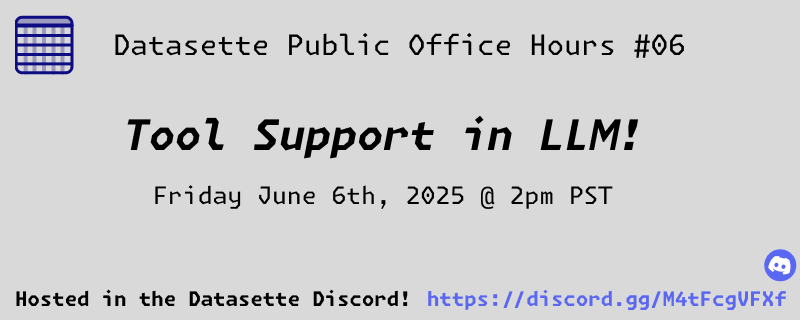
Here's a link to add it to Google Calendar.
Saying Bye to Glitch (via) Pirijan, co-creator of Glitch - who stopped working on it six years ago, so has the benefit of distance:
Here lies Glitch, a place on the web you could go to write up a website or a node.js server that would be hosted and updated as you type. 🥀 RIP 2015 – 2025.
Pirijan continues with a poignant retrospective about Glitch's early origins at Fog Greek with the vision of providing "web development with real code that was as easy as editing a Google Doc". Their conclusion:
I still believe there’s a market for easy and fun web development and hosting, but a product like this needs power-users and enthusiasts willing to pay for it. To build any kind of prosumer software, you do have to be an optimist and believe that enough of the world still cares about quality and craft.
Glitch will be shutting down project hosting and user profiles on July 8th.
Code will be available to download until the end of the year. Glitch have an official Python export script that can download all of your projects and assets.
Jenn Schiffer, formerly Director of Community at Glitch and then Fastly, is a little more salty:
all that being said, i do sincerely want to thank fastly for giving glitch the opportunity to live to its 3-year acqui-versary this week. they generously took in a beautiful flower and placed it upon their sunny window sill with hopes to grow it more. the problem is they chose to never water it, and anyone with an elementary school education know what happens then. i wish us all a merry august earnings call season.
I'm very sad to see Glitch go. I've been pointing people to my tutorial on Running Datasette on Glitch for 5 years now, it was a fantastic way to help people quickly get started hosting their own projects.
In addition to my workshop the other day I'm also participating in the poster session at PyCon US this year.
This means that tomorrow (Sunday 18th May) I'll be hanging out next to my poster from 10am to 1pm in Hall A talking to people about my various projects.
I'll confess: I didn't pay close enough attention to the poster information, so when I first put my poster up it looked a little small:
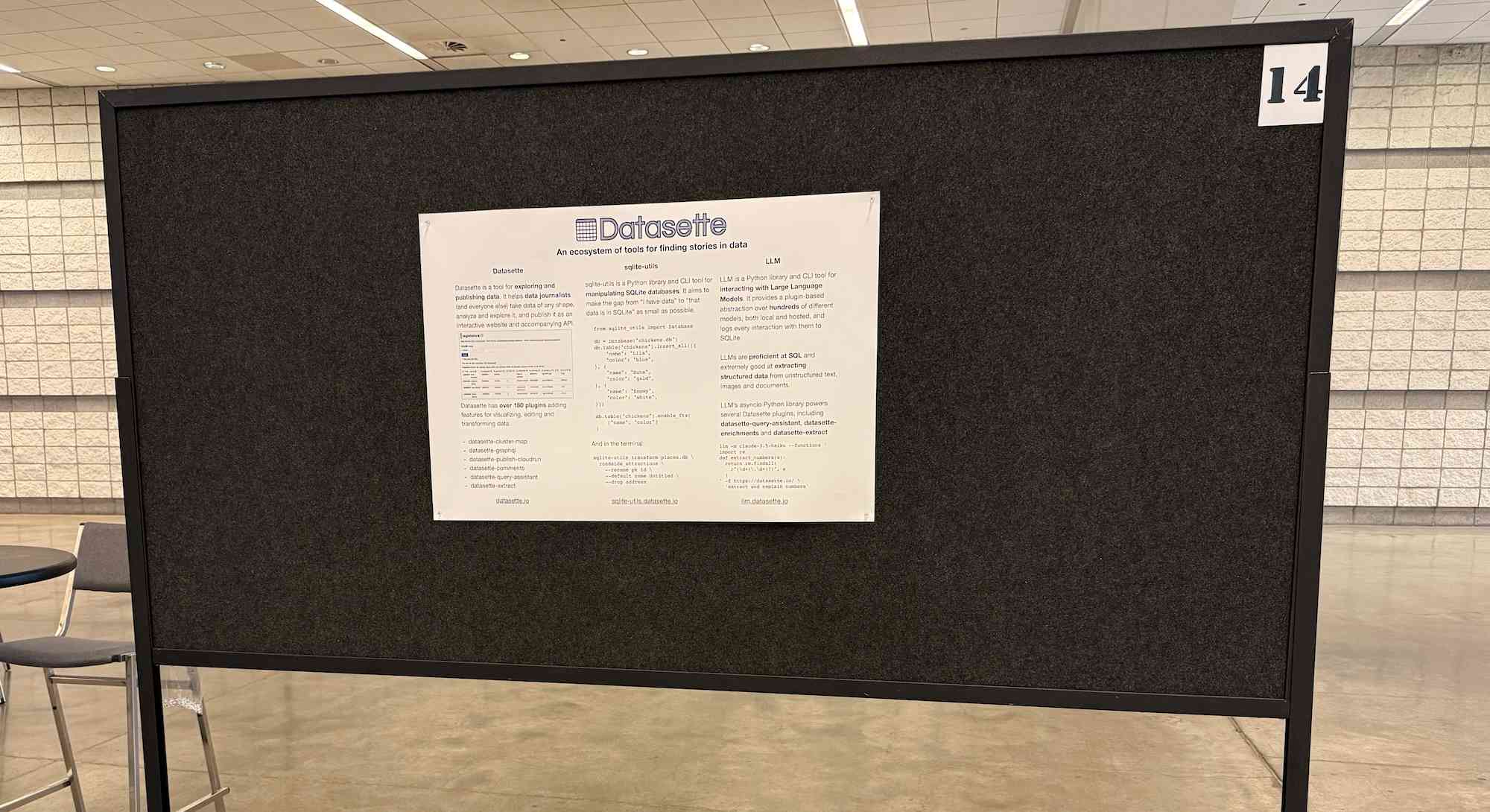
... so I headed to the nearest CVS and printed out some photos to better represent my interests and personality. I'm going for a "teenage bedroom" aesthetic here, I'm very happy with the result:
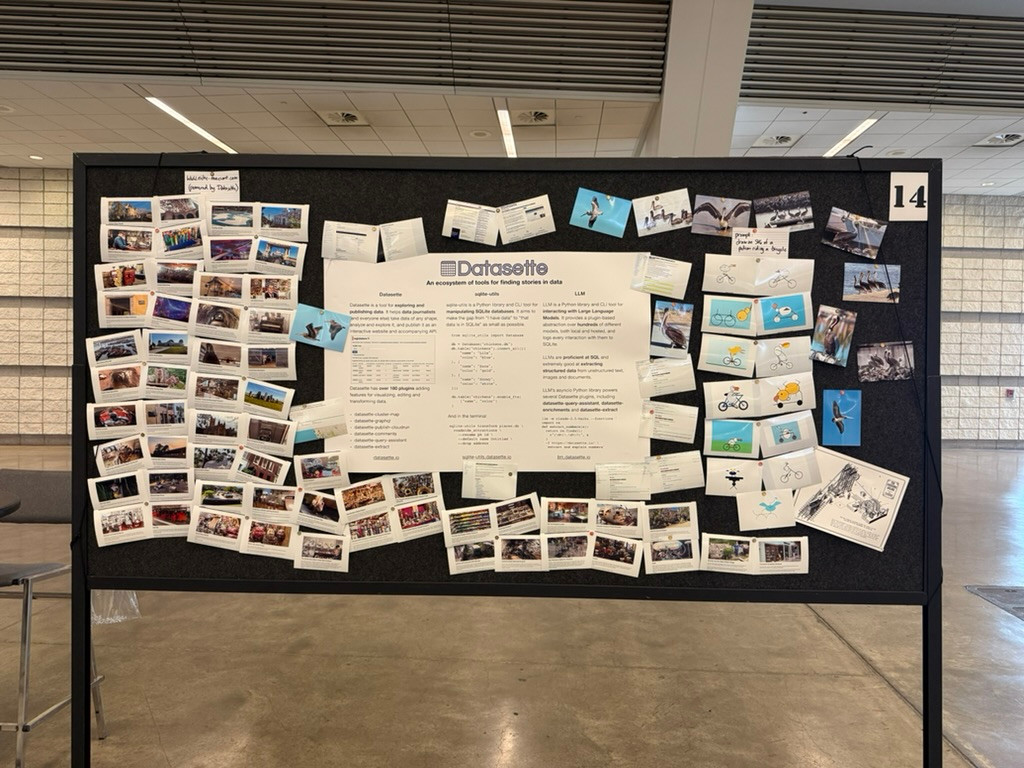
Here's the poster in the middle (also available as a PDF). It has columns for Datasette, sqlite-utils and LLM.

If you're at PyCon I'd love to talk to you about things I'm working on!
Update: Thanks to everyone who came along. Here's a 6MB photo of the poster setup. The museums were all from my www.niche-museums.com site and the pelicans riding a bicycle SVGs came from my pelican-riding-a-bicycle tag.
django-simple-deploy. Eric Matthes presented a lightning talk about this project at PyCon US this morning. "Django has a deploy command now". You can run it like this:
pip install django-simple-deploy[fly_io]
# Add django_simple_deploy to INSTALLED_APPS.
python manage.py deploy --automate-all
It's plugin-based (inspired by Datasette!) and the project has stable plugins for three hosting platforms: dsd-flyio, dsd-heroku and dsd-platformsh.
Currently in development: dsd-vps - a plugin that should work with any VPS provider, using Paramiko to connect to a newly created instance and run all of the commands needed to start serving a Django application.
Introducing Datasette for Newsrooms. We're introducing a new product suite today called Datasette for Newsrooms - a bundled collection of Datasette Cloud features built specifically for investigative journalists and data teams. We're describing it as an all-in-one data store, search engine, and collaboration platform designed to make working with data in a newsroom easier, faster, and more transparent.
If your newsroom could benefit from a managed version of Datasette we would love to hear from you. We're offering it to nonprofit newsrooms for free for the first year (they can pay us in feedback), and we have a two month trial for everyone else.
Get in touch at hello@datasette.cloud if you'd like to try it out.
One crucial detail: we will help you get started - we'll load data into your instance for you (you get some free data engineering!) and walk you through how to use it, and we will eagerly consume any feedback you have for us and prioritize shipping anything that helps you use the tool. Our unofficial goal: we want someone to win a Pulitzer for investigative reporting where our tool played a tiny part in their reporting process.
Here's an animated GIF demo (taken from our new Newsrooms landing page) of my favorite recent feature: the ability to extract structured data into a table starting with an unstructured PDF, using the latest version of the datasette-extract plugin.

The single most impactful investment I’ve seen AI teams make isn’t a fancy evaluation dashboard—it’s building a customized interface that lets anyone examine what their AI is actually doing. I emphasize customized because every domain has unique needs that off-the-shelf tools rarely address. When reviewing apartment leasing conversations, you need to see the full chat history and scheduling context. For real-estate queries, you need the property details and source documents right there. Even small UX decisions—like where to place metadata or which filters to expose—can make the difference between a tool people actually use and one they avoid. [...]
Teams with thoughtfully designed data viewers iterate 10x faster than those without them. And here’s the thing: These tools can be built in hours using AI-assisted development (like Cursor or Loveable). The investment is minimal compared to the returns.
— Hamel Husain, A Field Guide to Rapidly Improving AI Products
files-to-prompt 0.5.
My files-to-prompt tool (originally built using Claude 3 Opus back in April) had been accumulating a bunch of issues and PRs - I finally got around to spending some time with it and pushed a fresh release:
- New
-n/--line-numbersflag for including line numbers in the output. Thanks, Dan Clayton. #38- Fix for utf-8 handling on Windows. Thanks, David Jarman. #36
--ignorepatterns are now matched against directory names as well as file names, unless you pass the new--ignore-files-onlyflag. Thanks, Nick Powell. #30
I use this tool myself on an almost daily basis - it's fantastic for quickly answering questions about code. Recently I've been plugging it into Gemini 2.0 with its 2 million token context length, running recipes like this one:
git clone https://github.com/bytecodealliance/componentize-py
cd componentize-py
files-to-prompt . -c | llm -m gemini-2.0-pro-exp-02-05 \
-s 'How does this work? Does it include a python compiler or AST trick of some sort?'
I ran that question against the bytecodealliance/componentize-py repo - which provides a tool for turning Python code into compiled WASM - and got this really useful answer.
Here's another example. I decided to have o3-mini review how Datasette handles concurrent SQLite connections from async Python code - so I ran this:
git clone https://github.com/simonw/datasette
cd datasette/datasette
files-to-prompt database.py utils/__init__.py -c | \
llm -m o3-mini -o reasoning_effort high \
-s 'Output in markdown a detailed analysis of how this code handles the challenge of running SQLite queries from a Python asyncio application. Explain how it works in the first section, then explore the pros and cons of this design. In a final section propose alternative mechanisms that might work better.'
Here's the result. It did an extremely good job of explaining how my code works - despite being fed just the Python and none of the other documentation. Then it made some solid recommendations for potential alternatives.
I added a couple of follow-up questions (using llm -c) which resulted in a full working prototype of an alternative threadpool mechanism, plus some benchmarks.
One final example: I decided to see if there were any undocumented features in Litestream, so I checked out the repo and ran a prompt against just the .go files in that project:
git clone https://github.com/benbjohnson/litestream
cd litestream
files-to-prompt . -e go -c | llm -m o3-mini \
-s 'Write extensive user documentation for this project in markdown'
Once again, o3-mini provided a really impressively detailed set of unofficial documentation derived purely from reading the source.
URL-addressable Pyodide Python environments
This evening I spotted an obscure bug in Datasette, using Datasette Lite. I figure it’s a good opportunity to highlight how useful it is to have a URL-addressable Python environment, powered by Pyodide and WebAssembly.
[... 1,905 words]Datasette 1.0a17. New Datasette alpha, with a bunch of small changes and bug fixes accumulated over the past few months. Some (minor) highlights:
- The register_magic_parameters(datasette) plugin hook can now register async functions. (#2441)
- Breadcrumbs on database and table pages now include a consistent self-link for resetting query string parameters. (#2454)
- New internal methods
datasette.set_actor_cookie()anddatasette.delete_actor_cookie(), described here. (#1690)/-/permissionspage now shows a list of all permissions registered by plugins. (#1943)- If a table has a single unique text column Datasette now detects that as the foreign key label for that table. (#2458)
- The
/-/permissionspage now includes options for filtering or exclude permission checks recorded against the current user. (#2460)
I was incentivized to push this release by an issue I ran into in my new datasette-load plugin, which resulted in this fix:
- Fixed a bug where replacing a database with a new one with the same name did not pick up the new database correctly. (#2465)
S1: The $6 R1 Competitor? Tim Kellogg shares his notes on a new paper, s1: Simple test-time scaling, which describes an inference-scaling model fine-tuned on top of Qwen2.5-32B-Instruct for just $6 - the cost for 26 minutes on 16 NVIDIA H100 GPUs.
Tim highlight the most exciting result:
After sifting their dataset of 56K examples down to just the best 1K, they found that the core 1K is all that's needed to achieve o1-preview performance on a 32B model.
The paper describes a technique called "Budget forcing":
To enforce a minimum, we suppress the generation of the end-of-thinking token delimiter and optionally append the string “Wait” to the model’s current reasoning trace to encourage the model to reflect on its current generation
That's the same trick Theia Vogel described a few weeks ago.
Here's the s1-32B model on Hugging Face. I found a GGUF version of it at brittlewis12/s1-32B-GGUF, which I ran using Ollama like so:
ollama run hf.co/brittlewis12/s1-32B-GGUF:Q4_0
I also found those 1,000 samples on Hugging Face in the simplescaling/s1K data repository there.
I used DuckDB to convert the parquet file to CSV (and turn one VARCHAR[] column into JSON):
COPY (
SELECT
solution,
question,
cot_type,
source_type,
metadata,
cot,
json_array(thinking_trajectories) as thinking_trajectories,
attempt
FROM 's1k-00001.parquet'
) TO 'output.csv' (HEADER, DELIMITER ',');
Then I loaded that CSV into sqlite-utils so I could use the convert command to turn a Python data structure into JSON using json.dumps() and eval():
# Load into SQLite
sqlite-utils insert s1k.db s1k output.csv --csv
# Fix that column
sqlite-utils convert s1k.db s1u metadata 'json.dumps(eval(value))' --import json
# Dump that back out to CSV
sqlite-utils rows s1k.db s1k --csv > s1k.csv
Here's that CSV in a Gist, which means I can load it into Datasette Lite.
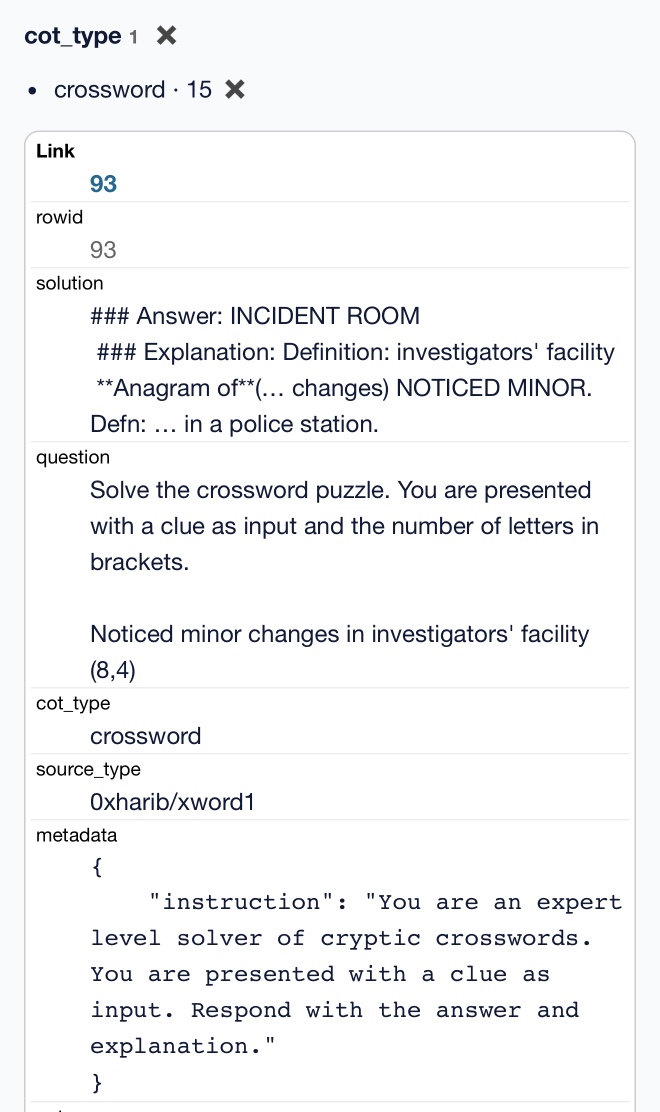
It really is a tiny amount of training data. It's mostly math and science, but there are also 15 cryptic crossword examples.
o3-mini is really good at writing internal documentation. I wanted to refresh my knowledge of how the Datasette permissions system works today. I already have extensive hand-written documentation for that, but I thought it would be interesting to see if I could derive any insights from running an LLM against the codebase.
o3-mini has an input limit of 200,000 tokens. I used LLM and my files-to-prompt tool to generate the documentation like this:
cd /tmp
git clone https://github.com/simonw/datasette
cd datasette
files-to-prompt datasette -e py -c | \
llm -m o3-mini -s \
'write extensive documentation for how the permissions system works, as markdown'The files-to-prompt command is fed the datasette subdirectory, which contains just the source code for the application - omitting tests (in tests/) and documentation (in docs/).
The -e py option causes it to only include files with a .py extension - skipping all of the HTML and JavaScript files in that hierarchy.
The -c option causes it to output Claude's XML-ish format - a format that works great with other LLMs too.
You can see the output of that command in this Gist.
Then I pipe that result into LLM, requesting the o3-mini OpenAI model and passing the following system prompt:
write extensive documentation for how the permissions system works, as markdown
Specifically requesting Markdown is important.
The prompt used 99,348 input tokens and produced 3,118 output tokens (320 of those were invisible reasoning tokens). That's a cost of 12.3 cents.
Honestly, the results are fantastic. I had to double-check that I hadn't accidentally fed in the documentation by mistake.
(It's possible that the model is picking up additional information about Datasette in its training set, but I've seen similar high quality results from other, newer libraries so I don't think that's a significant factor.)
In this case I already had extensive written documentation of my own, but this was still a useful refresher to help confirm that the code matched my mental model of how everything works.
Documentation of project internals as a category is notorious for going out of date. Having tricks like this to derive usable how-it-works documentation from existing codebases in just a few seconds and at a cost of a few cents is wildly valuable.
Datasette Public Office Hours 31st Jan at 2pm Pacific. We're running another Datasette Public Office Hours session on Friday 31st January at 2pm Pacific (more timezones here). We'll be featuring demos from the community again - take a look at the videos of the six demos from our last session for an idea of what to expect.
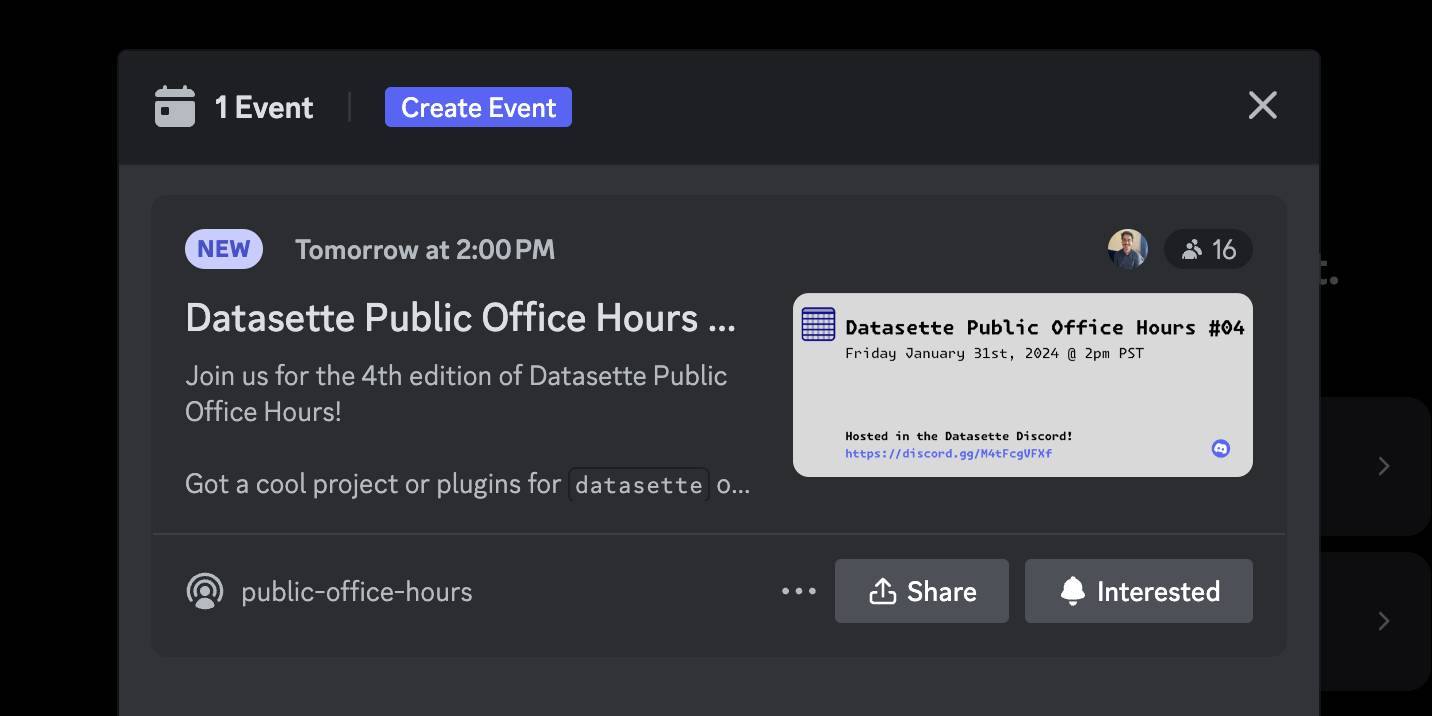
If you have something you would like to show, please drop us a line! We still have room for a few more demos.
Six short video demos of LLM and Datasette projects
Last Friday Alex Garcia and I hosted a new kind of Datasette Public Office Hours session, inviting members of the Datasette community to share short demos of projects that they had built. The session lasted just over an hour and featured demos from six different people.
[... 1,047 words]Datasette Public Office Hours Application. We are running another Datasette Public Office Hours event on Discord tomorrow (Friday 17th January 2025) at 2pm Pacific / 5pm Eastern / 10pm GMT / more timezones here.
The theme this time around is lightning talks - we're looking for 5-8 minute long talks from community members about projects they are working on or things they have built using the Datasette family of tools (which includes LLM and sqlite-utils as well).
If you have a demo you'd like to share, please let us know via this form.
I'm going to be demonstrating my recent work on the next generation of Datasette Enrichments.
Weeknotes: Starting 2025 a little slow
I published my review of 2024 in LLMs and then got into a fight with most of the internet over the phone microphone targeted ads conspiracy theory.
[... 520 words]

